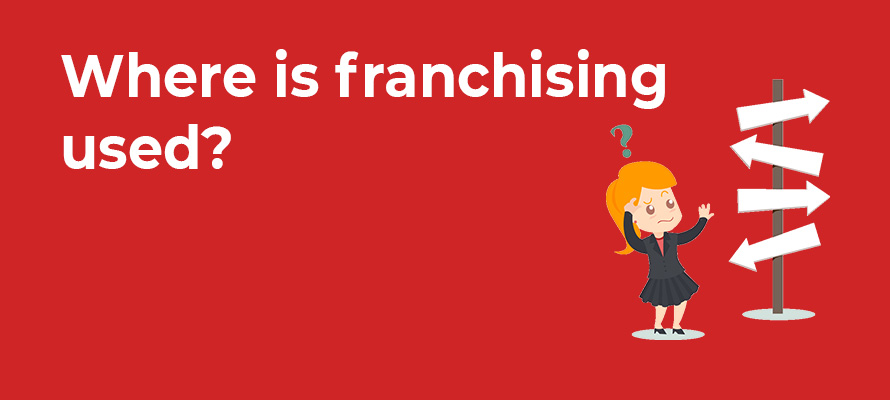Franchising is a concept that has gained traction in the last two centuries. In today’s era, more than 38 countries regulate franchising, and is a common trend in many others. Franchising occurs in many countries all around the globe.
Here is a list of every fact you need to know about franchising throughout the globe, and some facts about the many countries that host franchising:
Where did franchising start?
The history of modern franchising goes back to the early 1800s, and the first real scenario of franchising is seen with the entrepreneur “Isaac Merrit Singer”. Ever since the franchising of sewing machines, it gained traction and was eventually used in different companies like Coca Cola. The most prominent example of modern franchising was the selling of automobiles in the local market by Henry Ford – the founder of Ford.
Another notable example of modern franchising is the first female franchisor “Martha Matilda Harper” who was able to replicate and improve the business of franchising successfully.
Historically speaking, the first example of franchising goes back to the Colonial era, where people in power would give other people power and advice if they were able to pay a particular tribute to the Crown.
Here is a list of countries that have recorded their first-ever example of franchising:
United States
The United States has one of the most franchisors in the world. According to IFA, the United States claims more than 1500 franchisors, with approximately 320,000 franchisees.
Isaac Merrit Singer is the oldest known example of franchising in the United States, which dates to 1851.
Germany
Germany has the oldest known example of franchising in the world that still exists. Spaten Beer is a brand of beer that used to be brewed in Germany back in the 19th century. During the 1840s, a group of German ale brewers decided to grant taverns rights to sell and market their drinks, which indirectly led to franchising.
United Kingdom
Nothing beats passive income and indirect control over a market other than the United Kingdom. The UK is known for its conquests in the sub-continent through trading platforms. Although there is no concrete example, the Reform Act of 1918 virtually expanded the roots of franchising in the country. Through abolishing property qualifications for men.
China
China is known to be the oldest surviving civilization in the entire world. The Chinese are incredibly diligent and hard-working people, and franchising flourishes there so much that it is known as the most attractive country to look for franchising in 2019.
Franchising first emerged in the late 1980s, at least in the recorded form. It was done by KFC, as they opened their first outlet in Beijing. It was only a decade later, in 1997, that a formal franchise law was made and adopted by the Chinese government.
Turkey
Turkey is a unique country that is both Western and Eastern at the same time. Turkey has a pretty vague history when it comes to franchising. Still, it has been able to successfully increase attractiveness so much that it ranks number 3 on the attractiveness ranking of 2019.
Turkey has become home to many massive corporations that house franchising all over the globe too.
Australia
Australia has a more properly recorded history when it comes to franchising. The first cases of franchising in the country involved automotive and petroleum. It later expanded and made more familiar with the help of fast-food chain restaurants. By 1992, Australia had 450 franchise systems that were operating in the country.
The FCA, or Franchise Council of Australia, managed the franchise industry in Australia and was founded in 1982.
Sweden
Roughly 80% of all franchise businesses in Sweden are of Sweden origin. It proves that Sweden is a country of franchisors and not franchisees. The first franchise chain in Sweden was established in 1933, but it was not until the 1970s that it became ever so popular. Since Sweden is a part of the more magnificent European continent, franchising in the country is counted overall as a network.
Spain
Spain does not have a good history with franchising, as the franchise sector has its crises in the past. Spain, however, in recent years, has had good growth in the sector of franchising and is seen as one of the most sought-after countries to open a franchise.
South Korea
In recent news, South Korea intends to be one of the first countries to implement 5G. Historically speaking, franchising in SK is no longer than 30 years old, as the country had only an approximation of 4268 franchises in 2017.
It expects to have met or crossed the 5000 franchise mark by 2020. South Korea is seen as a popular destination for franchisors all around the globe to choose for franchisees as well. The market in SK is increasing rapidly too.
Scenarios where franchising is viable
Now that we are listing a few countries by history where franchising is used, here are some scenarios where franchising seems like a viable option:
Combine old with new
The old saying of combining old with new is significant for franchises as well. There is an old Japanese tale where if a valuable pot breaks, they remake it with gold linings, so it is stronger than ever—combining old with new uses the same concept.
Franchising is viable in businesses where you would want to combine an old business with a new business tactic, just like how Subway does it.
There are a few things to keep in mind, though:
- Does your business use an old, but common concept that everyone is aware of and used to?
- Do you think your business will have appeal in the modern market if it franchised?
- Do you think that the business will appeal, and tend to a more global market instead of only the local market?
- Does thinking about the idea behind your business spark interest in your fellow investors?
Your success can’t replicate
Your brand is everything. Many companies even gain brand after becoming franchisers. If you feel like you have succeeded as a business, and wish to franchise, here are a few pointers that you might to ponder on:
- Can your success be replicated in case any other company wanted to grow in your footsteps?
- Do you think you have something unique in the market?
- Does your brand have enough loyalty that people will prefer you over similar products?
- Does your brand get recognized in the market: both local and global?
You can afford to franchise
Franchising is not only taxing for the franchisees but also the franchisers. Franchisers must take a lot of time out of their pockets to support and provide consultation and training for franchisees.
Training franchisees are not cheap, and can often take months, if not more. If you feel like you can expand enough of your resources to a single franchisee until they can stand on their own, feel free to franchise.
If you are unable to focus enough energy and hold on to promises with your franchisee, you might see repercussions and even legal action.
Franchising is the best business strategy for you
Franchising is not always the best business strategy for all companies. There are cases where franchising has not been the best business strategy for everyone. In such cases, we would not recommend franchising.
Be sure to consult your consultants on whether your business model supports franchising and whether your company will benefit from this method or not.
The media agrees with you
Media has now become some of the most dangerous hindrances in the world of business. The media can propagate bad stories and destroy your reputation if any of your franchisees hurt them in any way.
Therefore, you should always check if the branch, you are going to the franchisee is okay with the media or not. It can take quite a lot of investment and excellent customer support to improve a franchise’s face on the general public.
The senate inquiry is coming soon
The last senate inquiry was made in 2014, and a lot of modifications done in the necessary industry code that covered franchising. Another senate inquiry should happen anytime soon, which can lead to any number of unknowns in the business market.
Your potential franchisees are not too far
Franchising is often a tough thing to maintain because of quality control. It is especially true for the food chain market because food chains want to keep the quality of each franchisee to a certain level.
Because there is a concept that the food should taste the same across all different franchisees of the same brand, it is tough to take control of franchisees that are far from the main branch. It is valid for foreign franchisees.
You should always check to see if you will be able to afford to franchise such a significant risk.
Final thoughts
We hope that this guide helped you understand where franchising happens and what scenarios are best for franchising.













